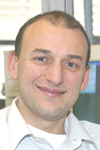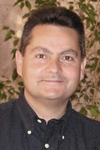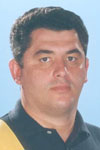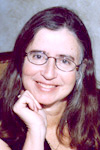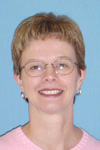
Prof. Kathryn W. Jablokow
kwl3@psu.edu
|
Kathryn W. Jablokow received her Ph.D. in Electrical Engineering from the Ohio State University in 1989. After spending one year as an NSF/NATO Postdoctoral Fellow at the Technical University of Aachen, Germany, she joined the faculty of the Pennsylvania State University in 1990, where she is now an Associate Professor of Mechanical Engineering. Prof. Jablokow conducts research in computationally efficient multibody dynamics, adaptive control, and applications of screw theory to robotics. She has also developed a graduate-level certificate program in creativity and problem solving for scientists and engineers, and is currently being funded to investigate the invention process.
Expertise: kinematics, multi-body dynamics, dynamic simulation,
multiple-robot systems
|
|
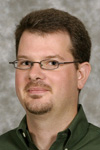
Prof. Herbert Tanner
tanner@unm.edu
|
Herbert Tanner received his Diploma and his
PhD in ME from the National Technical University of Athens, Greece,
in 1996 and 2001 respectively. From 2001 to 2003 he was a post-doc with the
Electrical and Systems Engineering Dep. at UPenn.
As a member of the GRASP Laboratory at UPenn, he was involved
in projects funded by DARPA.
In 2003, he joined the faculty of the Department of ME at the
University of New Mexico where he is currently an Assistant Professor.
Expertise: cooperative planning and control of interconnected multi-agent systems, coordination of mobile sensor and actuatorS networks, nonholonomic motion planning and control, hybrid modeling of embedded control systems, and mobile manipulation of deformable material.
|
|

Prof. Alex Zelinsky
Alex.Zelinsky@csiro.au
|
Alex Zelinsky is Director of the Information and
Communication Technologies (ICT) Centre within the Commonwealth Scientific Industrial Research
Organisation (CSIRO) in Australia (www.ict.csiro.au).
Prior to joining CSIRO Dr. Zelinsky Professor of Systems Engineering at the Australian National
University (1996-2004). He received his Bachelor (1983) and PhD (1991) degrees in computer science and electrical engineering from the University of Wollongong, Australia.
Dr. Zelinsky was CEO and co-founder of Seeing Machines Pty Ltd
(2000-2004) (www.seeingmachines.com).
Expertise:mobile robotics, human-machine interaction, intelligent transportation systems and real-time computer vision systems.
|
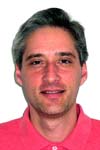
Prof. Gregory S. Chirikjian
gregc@jhu.edu
|
Gregory S. Chirikjian
(M'93) was born August 16, 1966 in New Brunswick,
New Jersey, USA. He received the
B.S.E. degree in engineering mechanics,
the M.S.E. degree in mechanical engineering,
and the B.A. degree in mathematics, all from
The Johns Hopkins University, Baltimore, MD,
in 1988. He then received the Ph.D. degree from
the California Institute of Technology, Pasadena, CA, in 1992.
Since the summer of 1992, he has been with the
Department of Mechanical Engineering, Johns Hopkins
University, where he is now Professor and Chair.
Dr. Chirikjian is a 1993 NSF Young investigator,
a 1994 Presidential Faculty Fellow, and a 1996 recipient of the ASME Pi Tau Sigma Gold Medal.
Expertise:: kinematic analysis,
motion planning, design, and implementatation of biologically inspired robots.
In particular, ``hyper-redundant,'' ``metamorphic,'' and ``binary''
manipulators, and most recently self-replicating robots.
In recent years Dr. Chirikjian has also
been applying methods from robotics to model conformational
transitions in biological macromolecules.
|
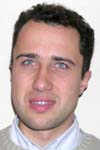
Dr. Cristian Secchi
secchi.cristian@unimore.it
|
Cristian Secchi
received the M.Sc. in Computer Science Engineering in July 2000 from the University of Bologna (I) and the Ph.D. in Information Engineering, curriculum Automation, in 2004 from the University of Modena and Reggio Emilia (I). Between the two degrees he has been working as a visiting scientist at the Delft University of Technology. Since January 2005 he is faculty member as assistant professor at the Department of Sciences and Methods of Engineering (DISMI) of the University of Modena and Reggio Emilia (I). He is involved in research projects related to control of industrial robots, haptics, telemanipulation and factory automation.
Expertise: telemanipulation, haptics, control of interactive robotic interfaces, teleoperation, robot control.
|
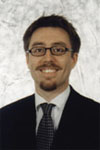
Dr. Magnus Egerstedt
magnus@ece.gatech.edu
|
Magnus Egerstedt
was born in Stockholm, Sweden. He received the M.S. degree in Engineering
Physics and the Ph.D. degree in Applied Mathematics from the Royal Institute
of Technology, Stockholm, in 1996 and 2000 respectively. His graduate research
was on hybrid control systems, with emphasis on motion planning and control of
mobile robots. He also received a B.A. degree in Philosophy and Linguistics from
Stockholm University in 1996.
During 1998 he was a Visiting Scholar at the Robotics Laboratory at the
University of California, Berkeley, and he spent 2000-2001 as a Postdoctoral
Fellow at the Division of Engineering and Applied Science at Harvard University.
Following this he joined the Systems and Controls Group at Georgia Tech in 2001.
Expertise: Robot Control, Hybrid automatas, mobile robotics..
|
